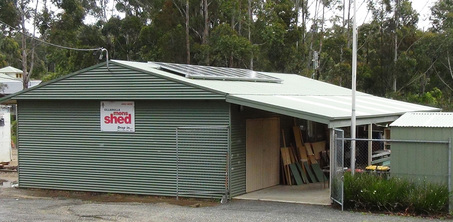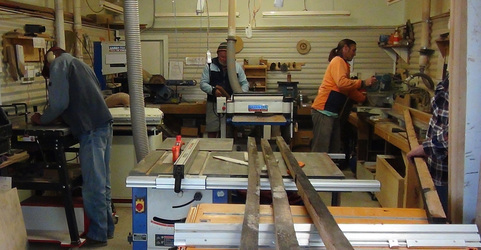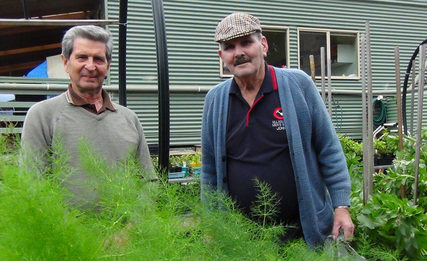 Ulladulla Men's Shed New South Wales Australia
Ulladulla Men's Shed New South Wales Australia You can find inspiring stories about lifewide learning everywhere. I am visiting my mother in Australia this week who lives in a small coastal town over 200km south of Sydney. I love coming to her home which she has lived in for 28 years. It's very peaceful apart from the ticking clocks and the colourful and noisy parakeets, lorikeets and rosella's that fly around continuously. The time I spend here is always good for reflection especially when I take long walks along the local beaches. The place triggers memories of different visits we have made over twenty years as my children grew up and eventually visited their grandparents by themselves. In many respects this has been the family home for the third and now the fourth generation of the Jackson clan, for we are many.
Whenever I visit Australia I'm always on the lookout for interesting ideas that I can relate to Lifewide Education's interests. I am never disappointed. On my last visit I discovered a local charity called the Dunn Lewis Foundation(1) that had been set up in memory of young people who had been killed in the Bali nightclub bombing doing a lot of good work to support young people and help them develop skills to gain employment but more generally to develop themselves as confident people. This week I discovered 'Men's Sheds' because just across the road from my mother's house in Narrawallee sits the Ulladulla Men's Shed.
 Men working in the Ulladulla Men's Shed
Men working in the Ulladulla Men's Shed The story of how men formed their own purposeful social groups around the idea of coming together in a shed to socialise and make things is a great story for the Social Age. The grassroots social movement began in Australia(2) in the mid 1990s when a group of men realised that it would be great fun to have a shed in which they could meet regularly to do something practical - especially to make or fix things. The idea quickly caught on and many sheds were established in local communities and by 2006 the government set up an organisation1 to help coordinate and support the creation of more men's sheds. In fact the Men's Shed movement is now part of the Australian health infrastructure that supports programmes to improve men's health and well being. It's a great example of how a local grassroots idea, became a social phenomenon that eventually drove government policy.The value is in making friends, feeling useful, making a contribution and learning new things
The idea of meeting up with other men to do something of practical value, often making toys and furniture to raise money for charities, appeals to men both living alone or with partners and at all ages although the vast majority of 'shedders' are at or beyond retirement date. Many older men lose some sense of purpose with the loss of their work role, status, workmates, income etc and can find themselves disengaged from their community if the pub or sports is not their thing. The generality of community activities on offer do not appeal to men and with their own expectation of meeting their own needs then some level of social isolation can occur. Men with their own shed have often developed their skills and interests there but in a larger facility, with better or more equipment, with skills you can develop with others and jobs you can do for the community a Men's Shed offers something new. Finding a way of working, alongside others and with a purpose in view but without imposed demands can be exactly what many men need.
And it doesn't stop at making things there are also activities such as making music and cooking. Like the Melton Men's Shed, 45km northwest of Melbourne, where every Tuesday men prepare and cook a two-course meal. It's part of a national trend where older men who have been looked after by wives who are no longer with them, can learning to cook for the first time.
Emerging global phenomenon
There are now more than 1,200 sheds in Australia and the scheme has gone global. There are nearly 200 sheds in Ireland and over 100 in the UK with a new shed opening every three days (4). The growth of Men's Sheds is an emergent social response to the need for men, particularly over the age of 50, to make themselves useful by finding new purposes in life when they have experienced a significant life change such as retirement, loss of a partner or debilitating illness.
Social isolation, loneliness and stressful social ties are common amongst older men, and are associated with poor physical and mental health, higher risk of disability, poor recovery from illness and early death. According to a 2014 survey by Age UK (4), more than one million people over 65 in the UK are often or always lonely, an increase of 38% on the previous year. Two-fifths of respondents said that their main form of company is the television. The UK is among the most socially isolated countries in Europe, according to research published in June 2014 by the Office for National Statistics. Asked whether they feel close to people in their local area, 42% said they did not – the highest proportion after Germany. The Campaign to End Loneliness, a national network set up in 2011, believes the issue is a “public health disaster” waiting to happen. Scientific research shows that for older people, loneliness is twice as unhealthy as obesity, as it is linked to high blood pressure, strokes and a weakened immune system.
Older men use fewer community based health services than women, and are less likely to participate in preventive health activities. They also find it harder than women to make friends late in life, and are less likely to join community-based social groups that tend to be dominated by women. Finding acceptable social interventions for lonely and isolated groups of disadvantaged older working class men is a challenge: one that is being addressed by the Men's Shed movement.
A synthesis of research on Men's Sheds (5) points in particular to the health and well-being benefits of men coming together in a purposeful way. Participation in a Men’s Shed, a community garden or other activity, is linked to older men’s desire to engage with their peers in work-like activity. This gives them a sense of identity, self-esteem and value and provides a space within which they can re-create a sense of masculinity in older age. Overall findings from these studies indicate that Men’s Sheds and other gendered interventions provide an array of benefits for older men including: learning new skills, sharing knowledge; personal achievement; community engagement; the opportunity to meet and interact with others. There is a strong association between having good social relationships through leisure and other forms of activity with good health. However, to date there is no robust measurable evidence that involvement in Men’s Sheds has a significant effect on the physical health of older men.

My father spent many years of his retirement, until he was well into his 80's, working voluntarily with a group of pensioners to make children's toys to raise money for a local charity that provided holidays for disabled children and their families. He also had his own shed (garage) full of tools neatly arranged and labelled on the walls and a heavy duty work bench where he made toys for the grandchildren and more recently great grandchildren - a dolls house for the girls and a garage for the boys . When he died six weeks ago my mother invited the men to come over from the Ulladulla Men's Shed across the road to help themselves to any of his tools. They had been so appreciative of the gift so I went over the road to introduce myself and say how pleased my dad would have been to see his tools being put to such good use. Apparently many 'Men's Shed's' receive donations of tools and equipment in this way - another great example of men helping other men even in their passing. I met Barry (left) who had started the project over 6 years ago - apparently the Ulladulla Men's Shed was number 35 in the whole of Australia. Barry had seen one on the north coast and decided it would be a good idea to have one in Ulladulla so he set about trying to raise awareness and money. The local council were not interested in supporting the project but a church was, and donated the land on which the shed sits. Over the last six years the project has grown and there are now over 100 men making use of the facility. On the day of my visit there were about 10 men busy working in the garden and workshops. Barrie told me that they receive very little financial aid but people make donations which are tax deductable. Mostly though, the Shed survives on the money they raise themselves through selling what they make or grow in the garden. While it might be tough to sustain the enterprise it is not only sustaining itself but there are plans for extending the shed to accommodate more men. Having seen it for myself you cannot fail to be impressed by the power in the idea and the even greater power in the implementation of it.
Relating this to the Social Age
So you might ask how does this relate to the Social Age? one of the themes Lifewide Education is exploring this year(6). In many respects the situation we are seeing in which men are physically coming together in the same space for companionship, to make themselves useful and to learn and be creative through the things they make, is more akin to the Manufacturing Age into which many of these men were born and learnt their values. It demonstrates to me the idea that each 'Age' of learning does not obliterate the earlier Ages, rather it subsumes and enriches it with new tools and approaches. I did not see or hear of Men's Sheds going digital but in my internet searches I discovered that there are opportunities for men to learn about computers and Web 2.0, and digital photography and in this way develop new skills that will enable them to participate in the Social Age of learning. And thanks to 'my sisters dongle' I was able to sit in my mother's lounge in Narrawallee and discover lots of things about Men's Sheds that I never knew before. In checking my twitter feed I discovered a blog by Steve Wheeler(7) that explained the theory of constructionism - a cognitive theory that relates to learning by making things and this seems like a useful theory within which to view what goes on inside Men's Sheds. The culture of learning we associate with the Social Age is all about participation and what Men's Sheds is all about is encouraging men to participate in their own self-determined projects within what Douglas Thomas and John Seeley Brown call 'collectives' (8). It's also about co-creation and the bounded spaces of a Men's Shed is full of creativity and co-creativity. It is in the sense of belonging and participation in a 'collective' for the purpose of creating and co-creating in order to contribute to society and to personal wellbeing where Men's Sheds intersect with the Social Age.
Acknowledgement
A big thank you to Barrie Wilford for inspiring me with the story of the Ulladulla Men's Shed.
Sources of information
1 Dunn Lewis Foundation http://www.dunnlewisfoundation.org.au/
2 Mens Sheds Australia http://www.mensheds.org.au
3 UK Mens Shed Association http://www.menssheds.org.uk/
4 Howard E (2014) ‘If I didn’t come to the shed, I’d be alone, watching TV’. The Guardian, Wednesday 8 October 2014 http://www.theguardian.com/society/2014/oct/07/mens-sheds-movement-isolation-loneliness-mental-health 5 Milligan C, Dowrick C, Payne C Hanratty B, Irwin P, Neary D, Richardson D (2013) Men’s Sheds and other gendered interventions for older men: improving health and wellbeing through social activity. A systematic review and scoping of the evidence base. A report for the Liverpool-Lancaster Collaborative (LiLaC) and Age UK
http://www.ageuk.org.uk/documents/en-gb/for-professionals/research/men%20in%20sheds%20age%20uk%20brief.pdf?dtrk=true
6 Lifewide Magazine Issue 11 Exploring the Social Age and the New Culture of Learning http://www.lifewidemagazine.co.uk/
7 Learning and Making Powerful Ideas http://steve-wheeler.blogspot.co.uk/2014/09/ learning-making-and-powerful-ideas.html?view=classic
8 Thomas D and Seeley Brown J (2011) The New Culture of Learning
http://www.newcultureoflearning.com/




 RSS Feed
RSS Feed